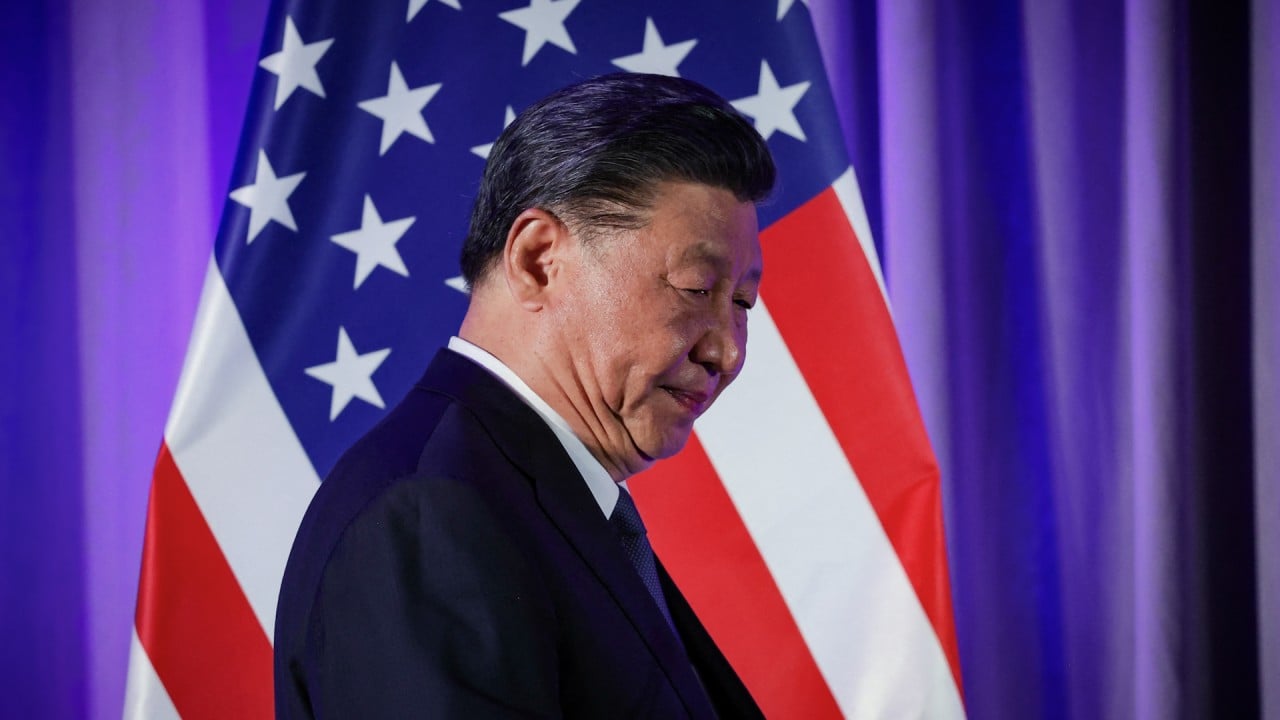[ad_1]
“The basic structure of the domestic capital market is different from that of foreign countries,” said the manager, who requested not to be named as he was not authorised to speak to the media.
“So if you simply apply foreign standards, it doesn’t really make sense.”
If problems were not solved when there were two different companies…you may even magnify the issues
The pledge on investment banks, which came during the twice-a-decade central financial work conference at the end of October, was followed by similar language from the China Securities Regulatory Commission (CSRC) three days later.
In a statement, the regulator vowed to support Chinese securities firms to “become better and stronger”, and “play an important role in serving the real economy and maintaining financial stability” through business innovation, better corporate management and the leveraging of mergers and acquisitions.
The brief message quickly lit up market sentiment, with stock prices soaring for firms that had mergers scheduled – or those that were simply speculated to have deals in the works by overzealous traders.
But professionals working in the sector said mergers would be little more than a short cut to scaling up, rather than a sustainable solution for structural weaknesses.
“If problems were not solved when there were two different companies, when you merge them, you may even magnify the issues,” the manager said.
A month later, the Securities Association of China, a non-profit association operating under the supervision of the CSRC and the Ministry of Civil Affairs, provided more clues on what standards for “first-class” institutions might entail.
According to a report from Securities Times, the organisation will include “supporting high-level technological self-reliance” as a criterion for evaluating Chinese investment banks.
Currently, leading Chinese full-service securities companies still lag behind their international counterparts in several areas, including global franchising, business scale, product sophistication and risk control.
As of the end of September, the total assets of Goldman Sachs and Morgan Stanley were US$1.58 trillion and US$1.17 trillion, respectively, eight and six times bigger than the 1.41 trillion yuan of Citic Securities – China’s largest.
One decisive factor is the short history of China’s capital market. China only entered the investment banking and fund management game in the 1990s, more than two centuries after Wall Street, said Chen Zhiwu, chair professor of finance at the University of Hong Kong (HKU).
The late start has resulted in a weaker position for securities firms in China’s financial sector, which has been long dominated by banks.
Xu Hongcai, deputy director general of the Financial and Economic Affairs Committee of the National People’s Congress (NPC), the country’s top legislature, said the current financial services system – which predominantly relies on bank loans – cannot meet the diversified needs of the present.
Technological innovation, strengthening industrial chains and residents’ wealth management were mentioned as zones of concern, as well as safeguarding common prosperity – the government’s plan to ameliorate inequalities on a societal level.
“There are few leading institutions in China’s securities and insurance industries. In global financial competition, there is a risk of being controlled and suppressed by international financial hegemony,” Xu said in a report to the NPC’s Standing Committee, the highest echelon of the legislature, in October.
“International financing capabilities and levels are not yet high. There are gaps with advanced foreign peers in terms of financial consulting, financing structure arrangements, risk prevention and control, and international market distribution capabilities,” he added.
Despite official acknowledgement of the disparities, Chen from HKU said the essential differences between Chinese investment banks and those of Wall Street may never disappear.
Chinese premier putting risk prevention first as head of new party finance body
Chinese premier putting risk prevention first as head of new party finance body
“One big difference between Chinese investment banks and Wall Street firms is that the former has a party committee whereas the latter does not,” he said.
“Another factor is that the Chinese economy is socialist in nature, whereas Wall Street is the heart and soul of American capitalism.”
Those differences are unlikely to change any time soon. At the central financial work conference, China’s top leadership pledged to “comprehensively enhance the Communist Party’s leadership in financial work” and deemed this feature an overriding requirement for risk control and prevention.
Rowena Chang, director of the nonbank financial institutions group for Greater China at Fitch Ratings, said top investment banking firms have strong positions in major markets across the globe, while Chinese companies mostly only have a significant presence in mainland China and Hong Kong.
“Scale benefits would allow global investment banks to have higher cost efficiency and larger financial resources to invest in product development and the associated risk control system,” Chang said.
These firms also have more diversified revenue streams and a much higher proportion of revenue generation from asset and wealth management, she added, while Chinese securities companies generate revenue predominantly from brokerage and proprietary trading.
Major US investment banks also lead in product complexity, such as developing a variety of financial derivatives, which prompts them to have more comprehensive risk control systems.
In contrast, Chang said, Chinese securities companies see more limitations due to stricter regulations.
Regulation is like a hammer, and securities firms are like nails…when you have a hammer you always want to smash nails
A Hong Kong-based derivatives trader at a Chinese securities firm said he has encountered a few instances of “window guidance” this year, where regulators would instruct securities firms directly to control the scale of some business, or refrain from other activities.
“Sometimes I feel it is difficult to speculate on the intentions of regulators. From the perspective of the people being regulated, the authorities may not really understand what we are doing, but their top priority is making sure that we are under their control,” the trader said on condition of anonymity.
“Regulation is like a hammer, and securities firms are like nails. Regardless of whether it is needed, when you have a hammer you always want to smash nails.”
At foreign investment banks, a primary principle is serving clients, but at Chinese securities firms, the trader said, authorities are the eternal “clients”.
There are also several bodies from which new strictures can flow, compounding confusion in an already complicated regulatory environment.
Along with the CSRC, guidance can also come from the State-owned Assets Supervision and Administration Commission, the state assets watchdog, or the National Development and Reform Commission, the country’s major economic planner.
Even China’s intelligence bureau has weighed in. In November, the Ministry of State Security took aim at short-sellers in a post on its official social media account and pledged to “proactively” protect the country’s financial stability by closely monitoring risks in the sector.
The simplest and best way for them to control risks is to give up certain businesses
Though strong regulation can prevent risk, it also curbs innovation, especially for Chinese securities firms – almost all of which are state-owned.
Senior managers at those government-backed institutions are more inclined to operate on the principle of “the less you do, the fewer mistakes”, as even the slightest error could be devastating for a potential future in politics.
“The overall systems of risk control and compliance at the Chinese securities firms have not kept up, so they do not have the infrastructure to handle real market fluctuations,” a portfolio manager at a Chinese bank in Hong Kong said.
“The simplest and best way for them to control risks is to give up certain businesses,” the manager added, choosing to remain anonymous due to the sensitivity of the matter.
State buying of Chinese stocks will drive year-end rebound, Goldman predicts
State buying of Chinese stocks will drive year-end rebound, Goldman predicts
Under these circumstances, multiple sources said, it is difficult to cultivate talent that can catch up with those on Wall Street. Without the space to improve firms’ business mix, product sophistication and risk management, the most talented staff will leave for greener pastures.
With the domestic economy still flagging, however, major securities firms in China are all striving for a higher degree of internationalisation.
Currently, these companies generate most of their business revenue from the onshore market, compared to the sizeable international operations of global firms, Fitch Ratings’ Chang said.
For instance, China International Capital Corporation – the Chinese outfit with the most substantial international franchise – claims only about 20 per cent of its business from overseas.
And according to the company’s 2022 financial report, even that minority share predominantly comes from Hong Kong.
The discrepancy also stems from a lack of Chinese multinational corporations that have substantial overseas financing demands compared to those from the United States, multiple sources said.
The time may therefore be ripe, they said, for investment banks to attempt a concurrent internationalisation with Chinese enterprises in general, such as those in the electric vehicle industry.
Perhaps the biggest obstacle to the sort of international expansion required to make China’s firms “world-class” lies in the US dollar-dominated financial market.
It is impossible to build a financial powerhouse with a closed or a semi-closed financial system
“The US dollar is a hard currency, so most of the so-called first-class financial institutions in the world are based in the United States,” said a fund manager with 20 years of experience.
Other issues may be more domestic in nature. Wu Xiaoqiu, former vice-president of Renmin University of China and dean of the China Capital Market Research Institute, said a diversified, open and international financial system is indispensable for China’s goal of becoming a financial powerhouse.
“It is impossible to build a financial powerhouse with a closed or a semi-closed financial system,” Wu said during the annual China Macroeconomic Forum last month.
“The big problem we face now is how to make the yuan freely tradeable, how to achieve internationalisation and how to strike a balance with the security of foreign exchange reserve assets.”
[ad_2]
Source link
























